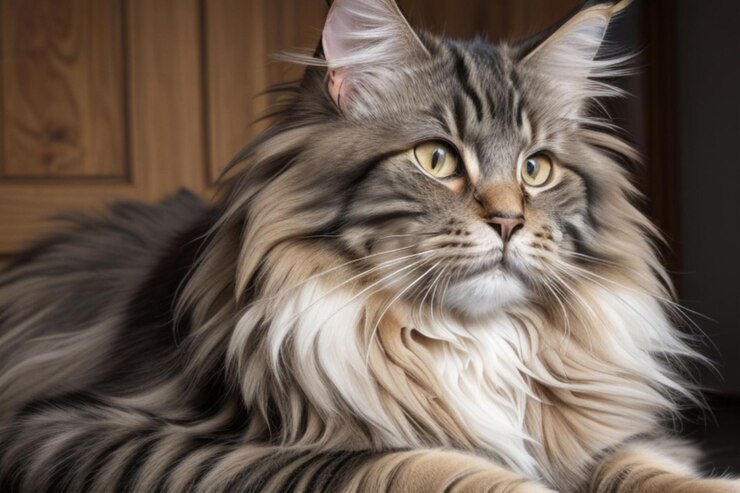Introduction to Domestic Long Hair Cats
Domestic Long Hair cats, often referred to as “DLH,” are a fascinating and diverse group of cats known for their luxurious coats and charming personalities. These cats are not a specific breed but rather a category that encompasses various cats with long, fluffy fur. Let’s delve into what makes these felines so special.
Historical Background
The history of Domestic Long Hair cats is as varied as their appearance. They are believed to have originated from a mix of breeds brought to different parts of the world by seafarers and traders. Over time, these cats adapted to their environments, resulting in the diverse array of long-haired cats we see today.
Physical Characteristics
Size and Weight
Domestic Long Hair cats can vary significantly in size and weight. On average, they weigh between 8 to 15 pounds, with some larger males tipping the scales at 20 pounds or more. Their size can depend on their genetic makeup and overall health.
Coat and Color Variations
One of the most striking features of Domestic Long Hair cats is their coat. These cats have a dense, flowing coat that comes in a wide range of colors and patterns. From solid black to calico, tabby, and everything in between, their coats are as unique as their personalities.
Temperament and Personality
General Temperament
Domestic Long Hair cats are known for their friendly and affectionate nature. They are typically sociable and enjoy interacting with their human families. However, their temperament can vary depending on their individual experiences and genetics.
Interaction with Humans
These cats tend to form strong bonds with their owners. They are often described as being loyal and loving companions who enjoy spending time with their families. Many Domestic Long Hair cats are also quite vocal, using their meows and purrs to communicate with their human friends.
Interaction with Other Pets
Domestic Long Hair cats usually get along well with other pets, including dogs and other cats. Proper introduction and socialization are key to ensuring harmonious relationships within a multi-pet household.
Living with a Domestic Long Hair Cat
Ideal Living Conditions
Domestic Long Hair cats thrive in a variety of living conditions. They are adaptable and can comfortably live in both apartments and larger homes. The key is providing them with enough space to explore and play.
Indoor vs. Outdoor Living
While some Domestic Long Hair cats may enjoy the outdoors, it is generally safer to keep them indoors. Indoor living protects them from potential hazards such as traffic, predators, and diseases. If you do allow outdoor access, consider using a catio or supervised outings.
Health and Wellness
Common Health Issues
Like all cats, Domestic Long Hair cats can be prone to certain health issues. These may include dental problems, obesity, and heart disease. Regular vet visits are essential to monitor their health and catch any issues early.
Preventive Care
Preventive care is crucial for maintaining the health of your Domestic Long Hair cat. This includes regular vaccinations, flea and tick prevention, and maintaining a healthy weight through proper diet and exercise.
Regular Check-ups
Scheduling regular check-ups with your veterinarian is vital. These visits help ensure your cat stays healthy and any potential problems are addressed promptly. Annual or bi-annual visits are typically recommended.
Grooming Needs
Daily Grooming
Due to their long fur, Domestic Long Hair cats require regular grooming. Daily brushing helps prevent matting and reduces shedding. It also provides an opportunity to bond with your cat and check for any skin issues.
Dealing with Shedding
Shedding can be a concern with long-haired cats. Using a high-quality brush and grooming tools can help manage shedding. Regular grooming sessions will keep your home cleaner and your cat’s coat in top condition.
Bathing Tips
Bathing a Domestic Long Hair cat can be challenging but is sometimes necessary. Use a cat-specific shampoo and ensure the water temperature is comfortable. Make the experience as stress-free as possible by being gentle and patient.
Diet and Nutrition
Recommended Diet
A balanced diet is crucial for the health of your Domestic Long Hair cat. High-quality commercial cat food that provides all the necessary nutrients is a good choice. Consult with your vet to determine the best diet for your cat’s age, weight, and health status.
Feeding Schedule
Establishing a regular feeding schedule is important. Most cats do well with two meals a day. Avoid free-feeding to prevent obesity, and ensure fresh water is always available.
Treats and Supplements
Treats can be a great way to reward your cat but should be given in moderation. Consider healthy treats that support dental health or provide additional nutrients. Supplements, such as omega-3 fatty acids, can also benefit your cat’s coat and overall health.
Training and Behavior
Basic Training Tips
Training your Domestic Long Hair cat can be a rewarding experience. Use positive reinforcement techniques such as treats and praise. Basic commands like “sit” and “stay” can be taught with patience and consistency.
Addressing Common Behavioral Issues
Behavioral issues such as scratching furniture or not using the litter box can arise. Providing appropriate scratching posts and keeping the litter box clean can help address these problems. If issues persist, consult with a veterinarian or a cat behaviorist.
Adopting a Domestic Long Hair Cat
Choosing the Right Cat
When adopting a Domestic Long Hair cat, consider your lifestyle and the cat’s personality. Spend time with potential adoptees to see which cat’s temperament aligns with your family.
Preparing Your Home
Prepare your home before bringing your new cat home. Create a safe and comfortable space with all the essentials, such as a litter box, food and water dishes, and cozy bedding.
The Adoption Process
The adoption process typically involves filling out an application, meeting the cat, and possibly a home visit. Once approved, you’ll pay an adoption fee, which often includes vaccinations and spaying/neutering.
Activities and Playtime
Favorite Toys
Domestic Long Hair cats enjoy a variety of toys. Interactive toys, such as feather wands and laser pointers, can provide hours of entertainment. Puzzle toys that dispense treats are also great for mental stimulation.
Engaging Activities
Engage your cat in activities that cater to their natural instincts. Climbing structures, scratching posts, and interactive play sessions can keep your cat active and happy.
Cost of Owning a Domestic Long Hair Cat
Initial Costs
Initial costs of owning a Domestic Long Hair cat include adoption fees, initial veterinary visits, and purchasing supplies like a litter box, scratching post, and toys. These costs can add up quickly but are essential for a smooth transition.
Ongoing Expenses
Ongoing expenses include food, regular veterinary care, grooming supplies, and pet insurance. Budgeting for these recurring costs ensures you can provide the best care for your cat throughout their life.
Traveling with Your Cat
Preparation Tips
Traveling with your Domestic Long Hair cat requires preparation. Invest in a sturdy carrier and get your cat accustomed to it before the trip. Pack essentials like food, water, and a portable litter box.
Ensuring Safety and Comfort
Ensure your cat’s safety and comfort during travel by securing the carrier and providing a familiar blanket or toy. Take breaks during long trips to allow your cat to stretch and use the litter box.
Breeding and Genetics
Genetic Diversity
Domestic Long Hair cats are a mixed breed, meaning they have a diverse genetic background. This diversity often results in a healthier cat population compared to purebred cats, as it reduces the risk of inherited genetic disorders.
Breeding Practices
Breeding Domestic Long Hair cats is not as common as breeding purebreds, but it does occur. Responsible breeders ensure the health and well-being of both the parent cats and the kittens. It is crucial to avoid backyard breeders who may not follow ethical breeding practices.
Famous Domestic Long Hair Cats
Popular Culture
Domestic Long Hair cats have made their mark in popular culture, appearing in books, movies, and even as internet sensations. These cats’ diverse appearances and charming personalities make them popular choices for pet roles in various media.
Historical Figures
Throughout history, many notable individuals have had Domestic Long Hair cats as pets. These cats have been companions to writers, artists, and even royalty, further cementing their place in human history.
Conclusion
Domestic Long Hair cats are a delightful addition to any household, offering love, companionship, and endless entertainment. Their unique appearances and friendly dispositions make them a favorite among cat lovers. Whether you are considering adopting one or are already a proud owner, understanding their needs and characteristics will ensure a happy and healthy life for your feline friend.
FAQs
Are Domestic Long Hair Cats hypoallergenic?
No, Domestic Long Hair cats are not hypoallergenic. Their long fur can trap more allergens, but regular grooming and cleaning can help reduce allergen levels in your home.
How long do Domestic Long Hair Cats typically live?
Domestic Long Hair cats typically live between 12 to 16 years, with some living even longer with proper care and a healthy lifestyle.
Do Domestic Long Hair Cats get along with dogs?
Yes, Domestic Long Hair cats can get along with dogs, especially if they are introduced properly and socialized from a young age. Each cat’s temperament will play a significant role in how well they adapt to living with a dog.
How often should I groom my Domestic Long Hair Cat?
It’s best to groom your Domestic Long Hair cat daily to prevent matting and reduce shedding. Regular grooming also helps you bond with your cat and monitor their health.
What are some common health issues in Domestic Long Hair Cats?
Common health issues in Domestic Long Hair cats include dental problems, obesity, and heart disease. Regular vet visits and preventive care are essential to keep your cat healthy.







